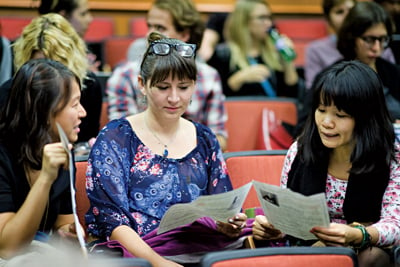2016 Graduate Education
THIS GUIDE IS NO LONGER ACTIVE. For the current FP Guide, click here.
Central European University, School of Public Policy
Central European University (CEU) in Budapest offers graduate-level English-language curricula in the social sciences, humanities, law, management, and public policy. Founded in 1991 by George Soros, chairman of the Open Society Foundations, it draws students from more than 100 countries, many of whom are especially interested in emerging democracies worldwide.

School of Public Policy, Central European University
The School of Public Policy (SPP) at CEU addresses global challenges through multidisciplinary study of public policy, innovative teaching and research, and meaningful engagement with policy practice. It is a global institution committed to creating a community of “purpose beyond power.”
“What is especially wonderful is the diversity of the student body,” says Julia Buxton, acting dean. The students in SPP’s three master’s degree programs and PhD public policy track come from six continents and more than 60 countries.
Economic diversity is also a hallmark of SPP. In addition to relatively low tuition and living costs, the school offers generous scholarships. “We’re not just targeting those who can afford the tuition,” says Buxton. New scholarship programs are available for students from Latin America and the Caribbean, Southeast Asia, the Middle East and North Africa, sub-Saharan Africa, and the Balkans. SPP also has scholarship programs for Roma students, and for Syrian immigrants whose studies were disrupted by the war.
Among the three dozen or so students in SPP’s two-year Master of Public Administration (MPA) program, generally no more than three or four come from any particular country. Students have a wide range of backgrounds, including experience in working in education, public health, gender issues, and more. We are not trying to impose a specific set of beliefs, but to look at how public policy should be addressed.
“We want students to be able to return to their home country and facilitate change there,” says Buxton. “This is a school where students learn from each other. The learning goes in all directions.”
In addition to developing leadership skills, students build transnational networks that will help them have an impact in their home countries and careers. “We develop students’ ability to understand the nature of the risks they’re taking,” says Buxton. Students learn about the types of changes that might be possible and consider key questions to make sure an initiative won’t unintentionally cause harm.
Thanks to students’ diverse backgrounds, “we learn about the public policy pressures in different countries,” says Buxton. “We are not trying to impose a specific set of beliefs, but to look at how public policy should be addressed.”
Contents
- 2016 Graduate Education
- Association of Professional Schools of International Affairs (APSIA)
- Boston University, Frederick S. Pardee School of Global Studies
- Central European University (CEU), School of Public Policy (SPP)
- Columbia University, School of International and Public Affairs (SIPA)
- The Fletcher School of Law and Diplomacy at Tufts University
- Georgetown University, Walsh School of Foreign Service (SFS)
- Indiana University, School of Global and International Studies
- Johns Hopkins University, School of Advanced International Studies (SAIS)
- Seton Hall University, School of Diplomacy and International Relations
- University of Kent, Brussels School of International Studies (BSIS)
- University of Minnesota, Humphrey School of Public Affairs
- The University of Texas at Austin, Lyndon B. Johnson School of Public Affairs
- University of Washington, Jackson School of International Studies

